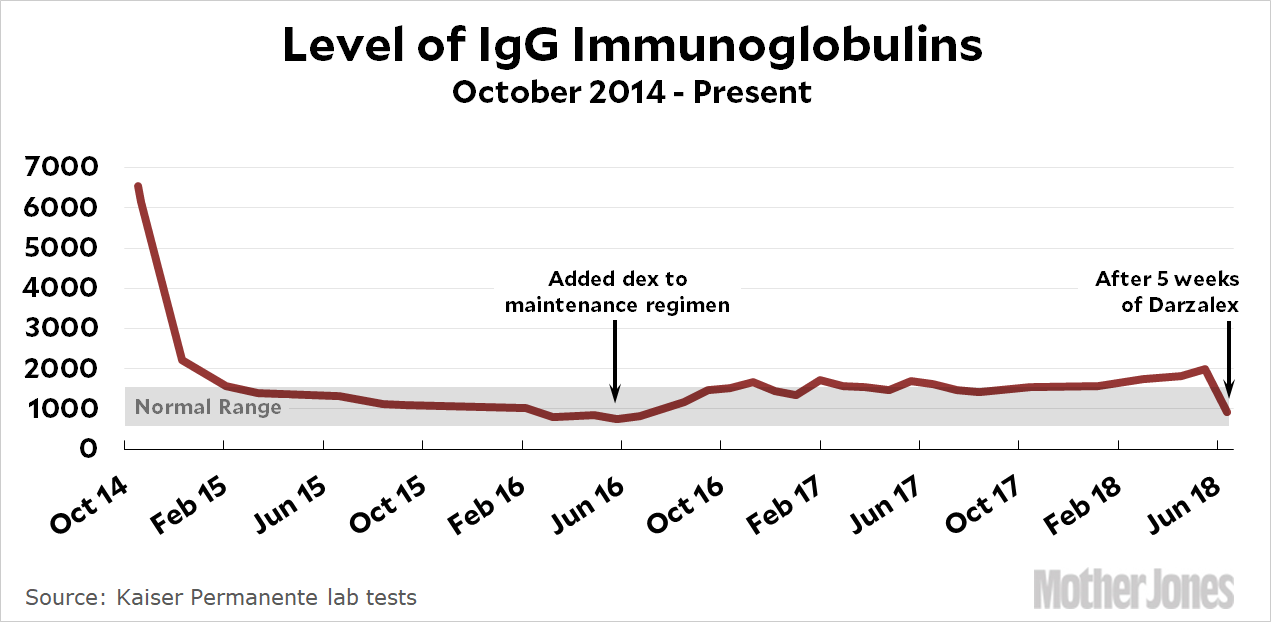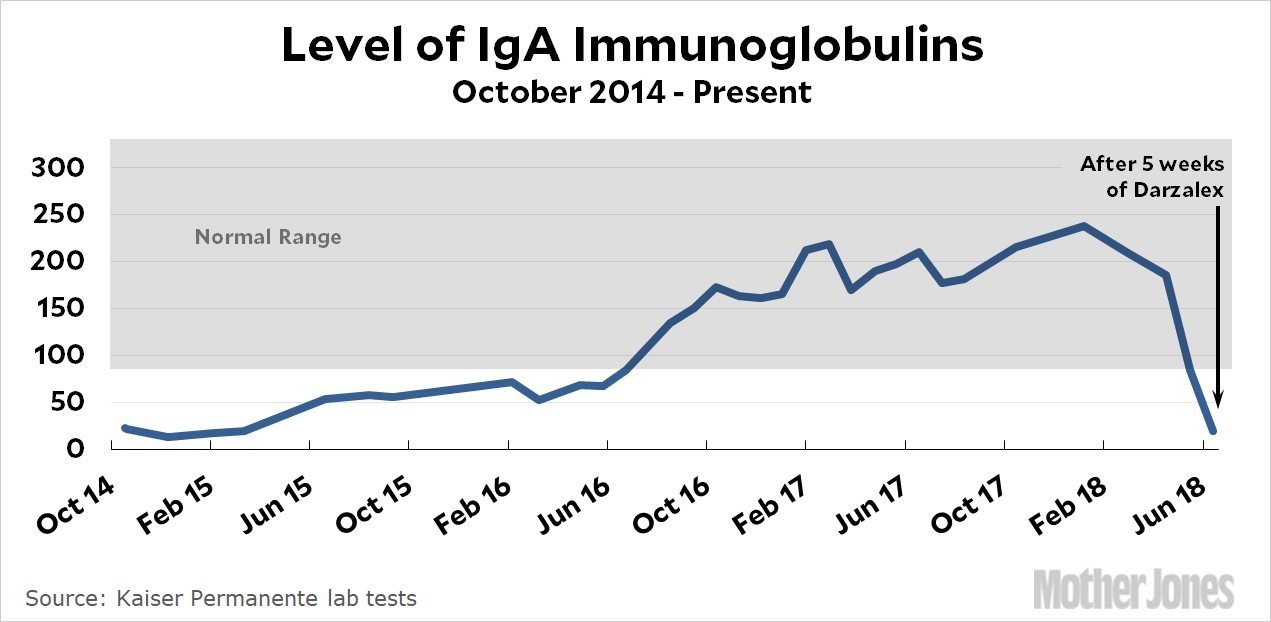First things first: everything is fine. Everything I said last week is still operative. My cancer load is down substantially and I generally feel pretty good.
And yet. Thanks to the evil dex (postponed to Friday this week thanks to the 4th of July holiday) here I am awake all night once again with nothing to do, so you’re all going to hear me rant a bit. To start with, here’s a new chart I haven’t shown you before:

The basic process of producing antibodies in humans looks like this:
Bone marrow → B cells → Lymph node → Plasma cells →
Antibodies → G, A, M proteins
Bone marrow produces white blood cells called B cells. These travel through the bloodstream to the lymph node, where they’re activated and turn into plasma cells. These in turn produce five kinds of immunoglobulins, better known as antibodies. There are three that we care about: IgG, IgA, and IgM, all of which are large protein molecules. My variety of multiple myeloma happens to be the G type—IgG light kappa if you want the whole enchilada—and as you can see in the chart, it was sky high at first. I had the normal number of healthy G antibodies plus a gigantic number of cancerous G antibodies that eventually would have overwhelmed the healthy ones.
The first round of chemo brought my G antibodies under control, and they dropped even further for a few months when we added dex to my maintenance regimen. Then they stabilized for a while, and around the beginning of the year started rising above the normal range. In May we switched to Darzalex, and the G antibodies plummeted almost immediately back into the normal range. This was a good sign that the cancerous antibodies were being killed off.
So that’s great. But what about my other antibodies? My M antibodies have declined slowly but steadily over the past four years, but not in any dramatic way. My A antibodies were low to begin with and then increased into the normal range, which was good news. But then came the Darzalex, which kills off immunoglobulins pretty indiscriminately:

On Monday I visited my oncologist, who seemed happy with my results so far. Just out of curiosity, though, I asked him what was going on with the A antibodies. Was this anything to worry about? He didn’t say anything much, but seemed not to think it was too big a deal.
So I left happy. Until I got a phone call from the oncology pharmacist telling me that this week’s chemo session was going to be canceled. My platelet level was low, and my doctor wanted to give it a week to recover. That seemed odd, since it’s been low ever since the first week of the new treatment, but OK.
But then I decided to chat a bit, and Melanie admitted that it wasn’t really the platelets that were bothering my doctor. It was the A antibody level. For some reason he didn’t feel like telling me this during our visit, but an antibody is an antibody and you really don’t want any of them to fall significantly below a healthy level. Each of them does different things, and if one of them goes way below its normal range it stops providing protection against certain kinds of infections—in the case of A antibodies, infections related to the mucous membranes and the gut. Because of this, Melanie told me, my chemo schedule was going to be immediately changed to biweekly for one of the drugs in my cocktail and monthly for the Darzalex.
In one sense this is bad news, since it means we’re cutting back on the Darzalex not because it’s done everything it can against my cancerous G antibodies, but because it’s having side effects that could become dangerous. On the bright side, it means the Darzalex is pretty effective. Overall, this is probably modestly negative news, but nothing super bad. After a few more months we’ll know if the A antibodies recover and the cancerous G antibodies continue to decline.
But. It turns out there’s one more thing nobody ever mentioned, and that’s the subject of my rant. My cocktail consists of three drugs, and you all know what the third one is: the evil dex. That particular drug will remain on a weekly schedule through December.
This pisses me off. Not because of the treatment itself, of course: if the dex needs to be weekly, then it needs to be weekly. That’s no one’s fault. But the dex badly compromises my sleep, and it gets worse and worse as time goes by. I don’t really mind the one night a week I stay awake, but a couple of weeks ago it got to the point where the rest of the days were bad too. I was sleeping only about five hours a night and napping a lot during the day. From previous experience, I know that this will deteriorate further, and I’ll be sleeping only 3-4 hours a night before long.
However, I’ve been resistant to restarting the sleep meds. I figured things would ease up when we went biweekly and then ease up some more when we went monthly. But it turns out there was never any reason to hold out. The dex was going to remain weekly the whole time, so I should have restarted the sleep meds after three or four weeks of treatment. And I would have if ANYBODY HAD BOTHERED TELLING ME WHAT THE ACTUAL CHEMO SCHEDULE WAS GOING TO BE.
But nobody did. As usual. My doctor, like every other oncologist I’ve encountered so far, seems to be almost pathologically averse to telling me much of anything, especially if it can be interpreted as bad news of any kind. I actually like my current doctor, who’s nowhere near as squirrely as my first one, but he still doesn’t tell me very much. Sometimes it’s because he doesn’t know, and that’s fine. Obviously there’s a lot of uncertainty in these treatments. But other times it turns out he does know, and only later do I find out the real story. This includes both diagnostic issues, like the decline in the A antibodies, and process issues, like the actual schedule for the drugs I’m taking.
I don’t understand this, and I don’t know what I can do to change it. I know that different patients react very differently to things, and doctors are sometimes cautious because they don’t know for sure what kind of response they might get to even modestly bad news. And yet, I still don’t think this is a good excuse for withholding their unvarnished opinions. That’s their job, after all, and it’s what I expect from them.
I also don’t understand why oncologists¹ are so often oblivious to the mechanics of the health care system they work in. They literally know almost nothing about how appointments are made, how the pharmacy operates, how scheduling works, etc. And when they do know, it often doesn’t occur to them that their patients might like to know this stuff too. My doctor, for example, probably never gave any thought to the possibility that I might care if the schedule for dex was going to be any different from the schedule for the other drugs. I can say, almost literally, that everything useful I’ve learned at a process level about my treatment has come from nurses and pharmacists.
So that’s it. That’s my rant. I have no idea what I can do about any of this, and obviously that’s frustrating. But it also means that I’m going to have a sleepless night once a week for the rest of the year. I’ve already started running out of ideas for nighttime photography excursions, and I sure don’t have enough ideas to fill up 20+ weeks. I better start thinking of other projects to take up my time.
¹I’m limiting this specifically to oncologists. Maybe it applies to all specialists. I don’t know. But my primary care doctor seems generally pretty knowledgeable about the nuts and bolts of how the bureaucracy works.

















